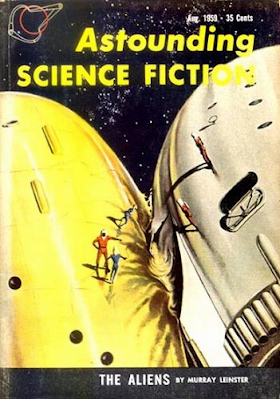Patti Abbott having posted a link in her consideration of another story by my choice of SSW author this week, I've just read the obituary for Ellen Gilchrist (1935-2024) from the New York Times by one Adam Nossiter, who gives the impression of resenting having to take a lesser role as obituarist after having been four times a bureau chief in the NYT hierarchy, or perhaps simply resents having to write one for a National Book Award winner he doesn't approve of. Gilchrist, to my knowledge, was not a great self-promoter, and if she diminished herself in her memoirs and some commentary over the years, Nossiter seems keen on making sure that's intensified in his not-quite-screed.
"Black Winter" (which can be read here) was Gilchrist's second and last story in F&SF, after her charming fantasy "The Green Tent" in the November 1985 issue (a grandmother and her grandson take the equivalent of a magic carpet ride in title device), and it's a far less cheerful item, a rather (necessarily) grim but not quite hopeless account of two survivors of a 1996 nuclear war, academics, an older woman named Rhoda (possibly not the same Rhoda who is a recurring character in earlier stories by Gilchrist) and her younger male protege Tannin, whom we meet several days after the short war, as they seek out what they can from various abandoned stores and gas stations in the midwest, keeping away from large cities in an abundance of (sensible) caution. Rhoda is writing the story in the form of a letter to her grandson, whom she hopes is still alive (but has no way of knowing, if so), in Germany; the colleagues get along, wondering if the fallout will eventually come down upon them in deadly form...and they meet up with some interesting folks with whom they can make some common cause. Rhoda had been noting with some concern the hotspots recurring in the news in 1996: Russia, Ukraine, Iran, North Korea. Things don't change so very much three decades later.
I had never picked up a copy of the June 1995 issue of F&SF, for whatever reason (I was moving into my last Virginia apartment, at least so far, about then), so I've just read the story for the first time tonight. I read "The Green Tent" when that issue was new, not so very long after I first read her work with "The Famous Poll at Jody's Bar" in The Atlantic Monthly for August 1982, one of her earlier publications.
It's a fine story, and makes its points well, and it (like "The Green Tent") has never been reprinted, as far as I can tell, anywhere but in an anthology in translation, by the former publisher of the German edition of F&SF (much as "The Green Tent" has only been reprinted, as far as I see, in Fiction, the French edition of F&SF).
I've been meaning to write about Gilchrist's collection The Cabal and Other Stories for a good six or seven years, but I'll have to excavate that volume and finish it. It really has been a tough year on writers I admire.
For more of today's short stories, please see Patti Abbott's blog, and her fine review of Gilchrist's "The Presidency of the Louisiana Live Oak Society".
And I'll seek out some less contemptuous obituaries than the Times's.
Contents: (Edward L. Ferman, editor and publisher)
Contents: (edited by Kristine Kathryn Rusch and Edward L. Ferman, published by Ferman)















